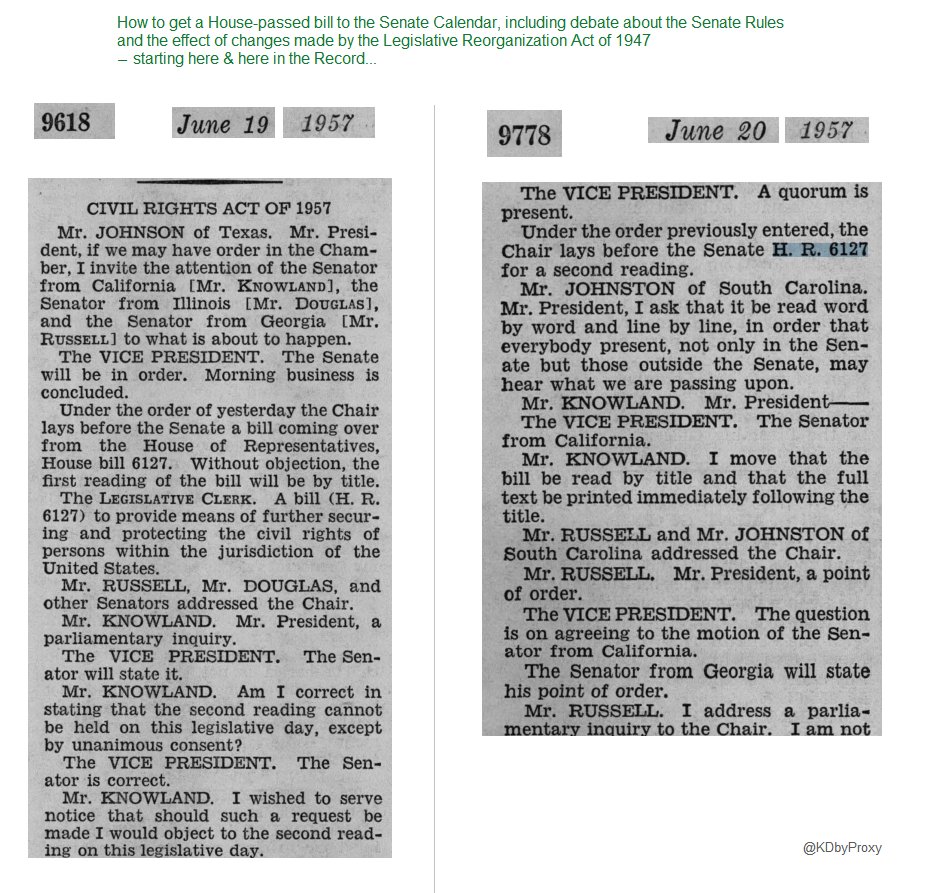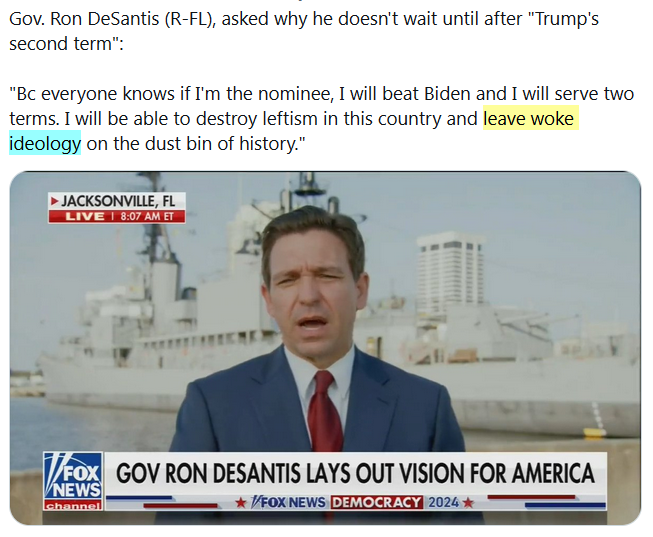This is a story about the time Robert C Byrd bluffed & attrited his way to setting a Senate precedent.
The Senate must be in Executive Session before it may consider an item on the Executive Calendar – eg, a nomination. That used to be a two-step process, as seen here…
#SRules
The Senate must be in Executive Session before it may consider an item on the Executive Calendar – eg, a nomination. That used to be a two-step process, as seen here…
#SRules

There, Majority Leader Mike Mansfield:
1) made a non-debatable motion to go into Exec Session, and after it was agreed to
2) made a debatable motion to consider a specific nomination.
1) made a non-debatable motion to go into Exec Session, and after it was agreed to
2) made a debatable motion to consider a specific nomination.
But after Byrd replaced Mansfield as majority leader in 1977, he went about creating a non-debatable ONE-step process. Why? B/c if he could find enough votes for cloture on a nomination a group of Repubs was filibustering, a one-step process would save him lots of floor time.
So, how did Byrd do it?
In 1978, on a Friday the 13th, after Byrd's unanimous consent request to both go into Exec Session and move to a particular nomination was met with an objection, he simply made a single motion to do the same...
In 1978, on a Friday the 13th, after Byrd's unanimous consent request to both go into Exec Session and move to a particular nomination was met with an objection, he simply made a single motion to do the same...
And based on the Record, it seems Byrd somehow got Sen. Hatfield (R-OR) to think that that sort of combined motion was fine. The chair had told Hatfield that a combined UC request was in order, but then it appears Hatfield took that to also mean a combined motion was in order. 😳 







And with that "bluff" (that's how I see it), Robert C Byrd had his precedent for a single, combined motion to take up a nomination; the weakest sort of precedent – b/c there was no point of order followed by a ruling of the chair (or of the Senate) – but a precedent, nonetheless.
Then its March 1980 and Byrd decides to do it again: Use a single motion to 1) go into Exec Session, and 2) take up a specific nomination* – but this time…
(* – technically: to go into Exec Session & take up the first-listed nom vs SOP/starting with the first-listed treaty)



(* – technically: to go into Exec Session & take up the first-listed nom vs SOP/starting with the first-listed treaty)




... Byrd's opponent was Jesse Helms (R-NC) – who knew the rules better than Hatfield (and was tougher, too) – and so here we see Helms knock down the precedent/not-so-much-a-precedent that Byrd had created back in October 1978 when Hatfield didn't appreciate its import 

That was Helms' response to Byrd's (paraphrased) arg: "My single, combined motion is most certainly in order because, as the senator must know, there is no rule or precedent against it, and that the Senate has for 188 years always done it with 2 motions is of no matter here." 

While the chair (Sen. Morgan (D-NC); yes, the chair, NOT the Parliamentarian) ruled Byrd's motion out of order, in the end when Byrd appealed the ruling to the 59 D/I, 41R Senate, (surprise!) they voted NOT to sustain the ruling (38-54) – so Byrd got his precedent.
Or did he?
Or did he?

Yes, Robert C Byrd did get his precedent on March 5, 1980, though its breadth wasn't made clear until June: That it was (& is) now in order to make a single, non-debatable motion to both take the Senate into Executive Session & call up any eligible item on the Executive Calendar. 



Yes, if Repubs had asked the chair on June 19 for a ruling on the breadth of the March 5 precedent and Byrd hadn't liked it, he had the votes to overturn it. Still, it's worth noting that what he said on June 19th about the March 5 precedent contradicts his own words.
Iow, 🐂💩.
Iow, 🐂💩.

Meanwhile, if the Parl considers this to be good law, then
1) Schumer asking Biden to bundle all the blocked military promotions into one nomination,
2) SASC reporting them as one, and then
3) Schumer making one motion to go into ES to consider them as one sounds even better.
1) Schumer asking Biden to bundle all the blocked military promotions into one nomination,
2) SASC reporting them as one, and then
3) Schumer making one motion to go into ES to consider them as one sounds even better.

NOTE:
1) ~Most anything in the Senate is subject to a point of order.
2) After the chair rules on a PoO, a senator may appeal.
3) Appeals generally are debatable/filibusterable which could make ⤵️ messy
4) BUT an appeal re a PoO re a motion to go into Exec Session isn't debatable
1) ~Most anything in the Senate is subject to a point of order.
2) After the chair rules on a PoO, a senator may appeal.
3) Appeals generally are debatable/filibusterable which could make ⤵️ messy
4) BUT an appeal re a PoO re a motion to go into Exec Session isn't debatable

5) That ⬆️ is important b/c:
A) If Schumer does use a process like Byrd used, some senator will make a point of order, and
B) No matter how the chair rules on it, some senator will appeal, and then
C) To *set* the precedent needed to help get those military promotions confirmed…
A) If Schumer does use a process like Byrd used, some senator will make a point of order, and
B) No matter how the chair rules on it, some senator will appeal, and then
C) To *set* the precedent needed to help get those military promotions confirmed…
… the Senate MUST VOTE on the appeal, and
D) If the appeal were debatable, Tuberville (& others) would be able to endlessly debate it/filibuster, thereby blocking the Senate from getting to a vote on the ruling, meaning things would be just as stuck as they are now. But again...
D) If the appeal were debatable, Tuberville (& others) would be able to endlessly debate it/filibuster, thereby blocking the Senate from getting to a vote on the ruling, meaning things would be just as stuck as they are now. But again...
… it is possible – in order to set a precedent so those military promotions can get confirmed – to leverage the fact that an appeal regarding a motion to go into Exec Session is not debatable.
If anyone knowledgeable in the parliamentary arts sees smth I missed, pls lemme know.
If anyone knowledgeable in the parliamentary arts sees smth I missed, pls lemme know.
• • •
Missing some Tweet in this thread? You can try to
force a refresh

 Read on Twitter
Read on Twitter















